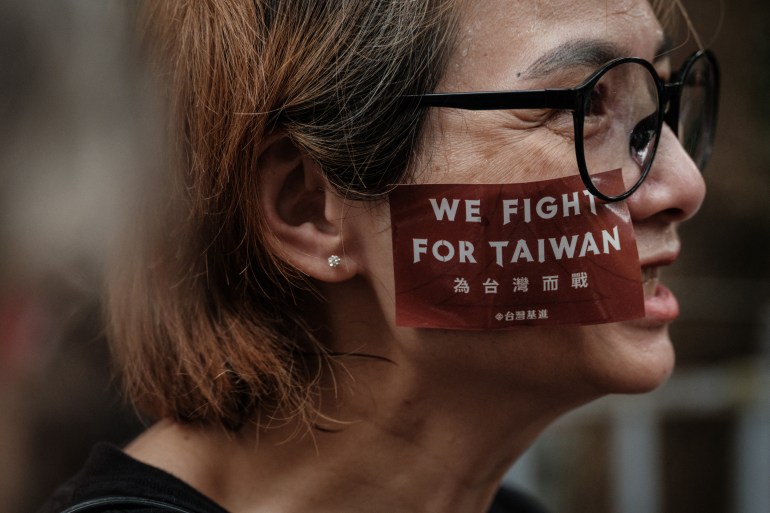Taipei, Taiwan – Protests are expected to resume in Taiwan on Friday over a divisive bill that would greatly expand the investigative powers of parliament and has already drawn thousands of people onto the streets.
Protesters gathered outside the legislature on Tuesday to coincide with the first reading of the bill, and legislators are due to sit again on Friday for the second reading.
While many democracies have similar provisions for legislative investigations – like the Watergate investigation in the United States or the phone hacking scandal in the United Kingdom – protesters say authors of the Taiwan bill have railroaded it through the voting process, and that it lacks the checks and balances necessary to prevent abuse.
Civil society and many legal scholars also oppose the bill, but the Kuomintang (KMT), which is backing it, says the reforms are necessary to “consolidate and refine” Taiwan’s democracy. Also included in the bill is an ambitious but controversial infrastructure project to link the island’s east and west coasts.
This week’s protests followed a brawl last Friday in the legislature over the same bill – something of a Taiwanese political tradition.

The opposition KMT, along with the smaller Taiwan People’s Party (TPP), secured a majority in parliament in January’s election, while William Lai Ching-te, from the rival Democratic Progressive Party (DPP), was elected president.
Here is all you need to know.
Why is this bill so controversial?
Critics of the bill say its scope is too wide and potentially unconstitutional. The bill would, in theory, grant legislators the power to question, investigate or demand documents from any government official, military general or the president.
This demand includes a vaguely worded clause about “contempt of the legislature”, which critics say could be used punitively for asking questions or “talking back”, criminalising officials who are unwilling to cooperate. Critics also say the bill is duplicating the work of the Control Yuan, a special government body empowered to investigate legislators and audit the government.
Critics fear the bill could threaten Taiwan’s national security, as it might force government officials to disclose critical information, according to Austin Wang, a US-based political scientist specialising in Taiwanese politics.
“In the bill, the legislators can ask the military to hand in sensitive information, which is problematic since some legislators have been accused of leaking information to China. There is no check-and-balance under this investigation any more,” he said.
What about the controversial infrastructure project?
While it has drawn fewer headlines, the bill also includes plans for a controversial $61bn infrastructure project that would build a high-speed rail and improve highways on Taiwan’s less populous east coast. The region is known for its rugged natural beauty, but it is also earthquake-prone and susceptible to typhoons and landslides, which is why the project has yet to be attempted.

Wang told Al Jazeera the size of the plan is untenable because it is equivalent to Taiwan’s annual budget. It would take away much-needed funding for Taiwan’s military if it hopes to deter China from a military attack.
He also said the plan might force Taiwan to take funding from China, which claims sovereignty over the island, and despite regularly threatening Taiwan’s existence, is also its largest trading partner.
Why are protesters calling the bill undemocratic?
This topic has been under discussion for some time in Taiwan’s legislative committees, but DPP legislators and critics say the KMT and the TPP are trying to push through their version of the bill without any consultation or input. DPP legislators allege they did not get to see the full text of the bill before it was put forward for a vote.
The timing of the bill is notable because it coincides with Lai’s inauguration. He took his oath of office on Monday marking the start of an unprecedented third term for the DPP.
The bill suggests it could be a bumpy political road ahead.
William Stanton, a former director of the American Institute in Taiwan, the de facto US embassy, told Al Jazeera the KMT and TPP appear to be engaged in a power play after losing the presidential election. Traditionally, Taiwan’s legislative agenda has been set by the executive branch of government, but the two parties appear set to shake up the system.
“I think it shows that [the KMT and TPP] see their majority in the Legislative Yuan as basically a backdoor way to undermine the election of Lai Ching-te. It’s unfortunate but that seems to be the case,” Stanton said.

Wu Min Hsuan, the co-founder of disinformation monitor Double Think Lab, said protesters were also not pleased about such behaviour.
“People are generally concerned that the KMT and TPP can pass any law they want, and take away any kind of deliberation. They don’t need the committee to agree with anything,” Wu said. “We don’t want a ‘winner takes all’. We don’t want if you have a majority of the parliament, you can take away that minority’s voice – because otherwise we don’t need legislators at all.”
What does the furore tell us about where Taiwan is heading?
Taiwan has a strong protest tradition and it is not unusual to see people out on the streets, but observers say the latest demonstrations are worth watching.
The feeling in the air is already reminiscent of 2014’s Sunflower Movement when student protesters occupied the legislature to block a trade bill that would have brought Taiwan closer to China. Much like 2014, the latest protests have drawn students and young people.
The strong youth showing is also notable for another reason.
During election season in December and January, the DPP struggled to attract their usual demographic of younger voters with many drawn to the TPP, which was promising fresh thinking under the iconoclastic former mayor of Taipei, Ko Wen-je. If the protest continues to grow at the legislature, it could change that narrative.
Read More: World News | Entertainment News | Celeb News
Al Jazeera









